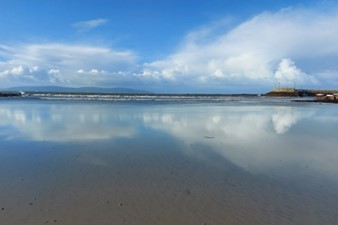Capturing Ireland’s Blue Carbon Potential
Share

This month the Marine Institute will launch a funding call for a major programme of research in the area of Blue Carbon. Blue Carbon has been identified as one of the ways in which marine and coastal ecosystems can reduce the impacts of climate change by absorbing and storing carbon from the atmosphere. Funding of up to €1.6m has been earmarked for the call to support a large-scale research project to run from 2021 to 2026.
Launched in June 2020, Ireland's Programme for Government recognised the 'the enormous Blue Carbon potential that the ocean has to offer in tackling climate change'. The government tasked the Marine Institute with a collaborative research initiative, aimed at investigating the climate-change mitigation potential of Blue Carbon, and working towards creating an inventory that will assist the EU in meeting Ireland's climate-change objectives.
In order to prepare the ground for such a large-scale research programme, the Marine Institute commissioned a synthesis report to review existing knowledge on Blue Carbon habitats and their role as carbon sinks in Ireland. The report, 'Blue Carbon and Marine Carbon Sequestration in Irish Waters and Coastal Habitats', was published in May 2021.
"Blue Carbon refers to carbon which is stored, or sequestered, in the ocean and in vegetated habitats around coastal regions," explains the report's lead author, Dr. Grace Cott, Assistant Professor at the UCD School of Biology and Environmental Science. "In terms of Blue Carbon which we can actively manage, what we are really referring to is the vegetation in coastal regions, and that means three main habitats: firstly, mangrove forests - which we don't have in Ireland and are mostly found in tropical regions - secondly, salt-marsh habitats and finally, seagrass meadows."
Carbon sequestration – the long-term capture and storage of Carbon Dioxide from the atmosphere – can take place through a range of natural processes, from photosynthesis, to sediment trapping, where carbon based sediments from the tide are physically trapped by vegetation. In addition, through the process of waterlogging, carbon release back to the atmosphere is prevented and carbon is stored long term.
The Marine Institute report points out that Ireland's tidally influenced coastal wetlands comprise approximately 160 square kilometres of salt-marsh and seagrass beds. Globally, although these habitats represent a much smaller area than terrestrial forests, their total contribution to long-term carbon storage is comparable to carbon sinks in tropical forests.
According to Dr. Cott, salt marshes in Ireland are up to ten times more efficient than agricultural grasslands at storing carbon on a per area basis. This is mainly due to the lack of microbial decomposition in these wet regions, which inland causes the release of carbon from the soil as Carbon Dioxide."
Supporting Blue Carbon into the future
The loss and destruction of vegetated coastal ecosystems threatens their ability to function as long-term carbon sinks, and mismanagement can lead to the release of stored carbon back into the atmosphere.
"But there is hope in the management of these resources," explains Cott. "Even though researchers need to conduct further research into the matter, we are already becoming aware of certain strategies which can help preserve our Blue Carbon habitats around the Irish coast."
"Regarding salt marshes, it is beneficial to allow them to migrate inland," she says. "So, as sea levels rise, if these habitats can migrate inland, that's a positive aspect in terms of carbon sequestration and coastal protection. One potential issue is in the building of sea walls as these can actually restrict the migration of the marsh inland.
"Then, in terms of seagrasses, which represent the other main Blue Carbon ecosystem in Irish coastal regions, we can aim to improve water quality to help seagrass beds to function optimally and keep on capturing and storing carbon. Looking ahead, I believe that Ireland will need an appropriate management framework, led by government, to enhance protection of these habitats in relation to carbon sequestration."
This focus on research is presented as part of the Marine Institute's four week Oceans of Learning campaign, which will enable everyone to engage with our ocean from anywhere. Oceans of Learning includes a new podcast series, videos and short films, news and online resources all about our ocean. There's something for everyone and the Oceans of Learning series will explore all aspects of our marine resource - from our rich marine biodiversity, to our changing ocean climate, and our ocean's future.